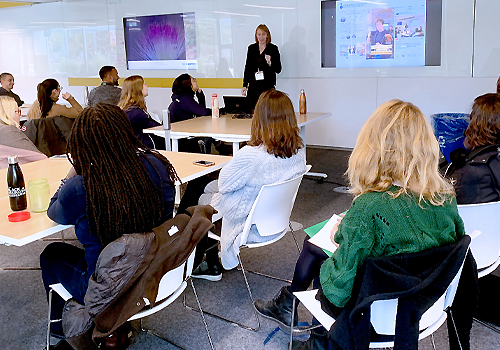In the second year of her undergraduate studies at U of T, Melanie Woodin failed a cell biology midterm. The young scientist found herself in tears.
Fast-forward to today, and Woodin is not only an award-winning neuroscientist in the Department of Cell & Systems Biology but also dean of the Faculty of Arts & Science.
“An advisor's reassurance and support were critical to me at that time,” recalls Woodin. “Without that, I wouldn't be where I am today. Asking for help is not a sign of weakness. We all need to do it throughout our careers.”
Woodin shared this personal story while welcoming attendees to the Arts & Science Advising Conference on November 6. The day-long event comprised a series of talks and workshops aimed at connecting, supporting and informing people who work in various kinds of student advising capacities.
To support student success, the Faculty is working to ensure students have access to an array of resources — from academic advising to financial support to mental health and wellness. And the engine behind these resources is dedicated people like academic advisors, registrars, learning strategists, departmental administrators and peer mentors who work hard every day to make the A&S student experience the best that it can be.
Asking for help is not a sign of weakness. We all need to do it throughout our careers.
— Melanie Woodin, Dean, Faculty of Arts & Science
Faculty Registrar and Director of Undergraduate Academic Services Deborah Robinson says a recent survey of advising in A&S highlighted the ways in which student advising has changed over the last decade.
“This made it clear that staff needed support in adapting to the new demands of the role,” says Robinson. “Given the renewed emphasis on student mental health and well-being, we felt it important to emphasize supporting students holistically.”
Building resilience and community, one student at a time
The conference’s keynote speaker, Michael Ungar, is the founder and director of the Resilience Research Centre at Dalhousie University. Ungar — a family therapist and professor of social work — is one of the world’s leading authorities on resilience in children, young people and adults.
Ungar’s research finds that resilience depends significantly upon an individual’s community and connection to resources — while therapeutic interventions and traits like a positive attitude can certainly help.
“Nobody harvests their resilience alone,” he says.

Photo: Diana Tyszko.
Student advisors are therefore “the locus of change,” says Ungar. Advisors can create supportive environments, connect students with resources, help facilitate social connections and point them in directions that strengthen feelings of control, purpose and self-confidence.
Advisers can “create worlds” around students, says Ungar.
Conference attendee Kristen Wantuchowicz, a residence operations coordinator at Woodsworth College, says Ungar’s research “left a lasting impression on me, highlighting impactful and relatable stories of resilience.
“Overall, the conference was an encouraging space to connect with colleagues and have really important conversations about the changing needs of students at U of T,” says Wantuchowicz.
Tailored advising: for each student, a world of their own
After Ungar’s keynote, breakout sessions focused on a wide variety of topics, from helping international students find their way at university to supporting advisors in maintaining their own health and well-being in what can sometimes be an emotionally taxing career.
Most importantly, sessions highlighted the need for tailoring advising work to an individual student’s needs through effective communication tactics, focusing on a student’s strengths and a thorough understanding of equity and diversity.
“This is the most diverse student generation in history,” said executive director of Student Life Programs & Services Heather Kelly, a panelist at the conference. “It's important for advisers to know how to find supports for our under-represented and marginalized students in key areas of identity like race, ethnicity, religion, ability, gender and sexual orientation.”
Robinson says preliminary feedback to the conference has been very positive.
“One participant told me she got more out of this conference than most conferences sponsored by professional associations because every session was relevant to, and referenced, the context and culture of Arts & Science,” says Robinson. “She also said it made her proud to know of the outstanding work being done by colleagues across the Faculty.”
Read Michael Ungar’s op-ed on the keys to resilience
- Put down the self-help books. Resilience is not a DIY endeavour
Globe and Mail | May 25, 2019

